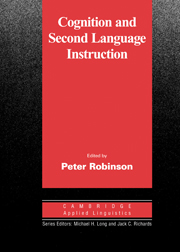Book contents
- Frontmatter
- Contents
- Series editors' preface
- Preface
- SECTION I THEORETICAL ISSUES
- SECTION II COGNITION AND INSTRUCTION
- 7 Cognition and tasks
- 8 Cognitive underpinnings of focus on form
- 9 Intentional and incidental second language vocabulary learning: a reappraisal of elaboration, rehearsal and automaticity
- 10 Task complexity, cognitive resources, and syllabus design: a triadic framework for examining task influences on SLA
- 11 Aptitude, individual differences, and instructional design
- 12 Cognition, instruction and protocol analysis
- References
- Index
9 - Intentional and incidental second language vocabulary learning: a reappraisal of elaboration, rehearsal and automaticity
Published online by Cambridge University Press: 05 October 2012
- Frontmatter
- Contents
- Series editors' preface
- Preface
- SECTION I THEORETICAL ISSUES
- SECTION II COGNITION AND INSTRUCTION
- 7 Cognition and tasks
- 8 Cognitive underpinnings of focus on form
- 9 Intentional and incidental second language vocabulary learning: a reappraisal of elaboration, rehearsal and automaticity
- 10 Task complexity, cognitive resources, and syllabus design: a triadic framework for examining task influences on SLA
- 11 Aptitude, individual differences, and instructional design
- 12 Cognition, instruction and protocol analysis
- References
- Index
Summary
Introduction
Most learners of a second language (L2) feel concerned with the burden of vocabulary learning and worry about the question of how to cope with the formidable task of learning thousands of words. This has been documented by a number of questionnaire, interview and case studies (Gu & Johnson, 1996; Jones, 1995; Lawson & Hogden, 1996; Porte, 1988; Sanaoui, 1995). Because of the sheer magnitude of the vocabulary learning task it is only quite natural that many L2 teachers feel uncertain about how to guide their students. Should they require their students to learn words intentionally, perhaps even by rote, or should they believe the rumours that intentional learning is not conducive to language learning? How much credence should they give to ideas like ‘new vocabulary must be presented in context’ and ‘the best way to acquire vocabulary is by “picking up” words incidentally, as a by-product of being exposed to large amounts of L2 input in reading and listening tasks’?
This chapter will look at what various theories have to say about incidental and intentional vocabulary learning. It will focus especially on three issues of key importance for L2 pedagogy: (1) the quality of information processing when an unfamiliar word is first encountered; (2) the quantity and quality of rehearsal activities needed for a word to be permanently available; and (3) the training of automatic access to word knowledge necessary for fluent language use.
- Type
- Chapter
- Information
- Cognition and Second Language Instruction , pp. 258 - 286Publisher: Cambridge University PressPrint publication year: 2001
- 294
- Cited by

